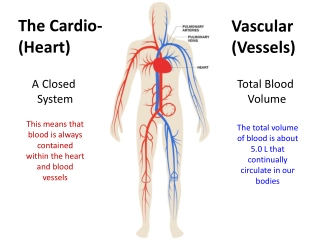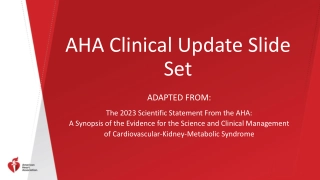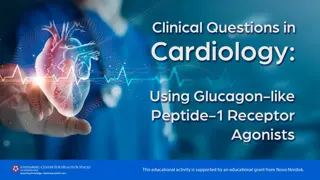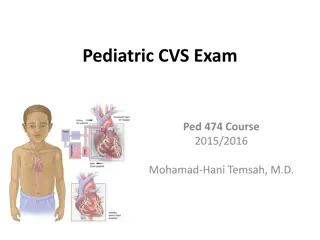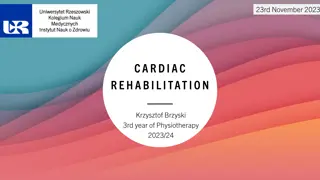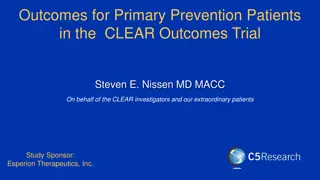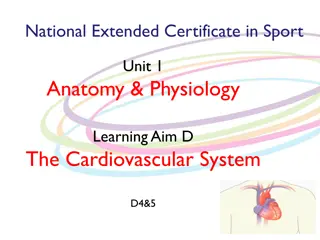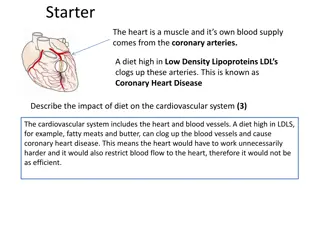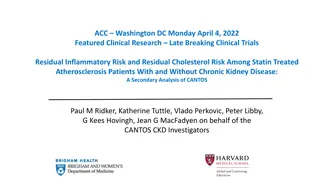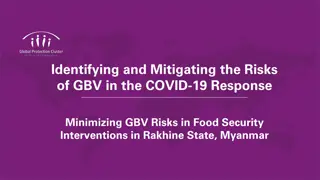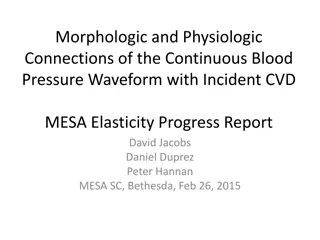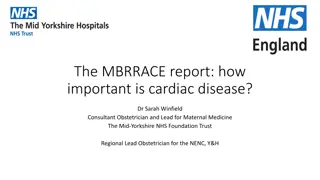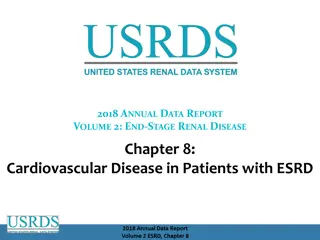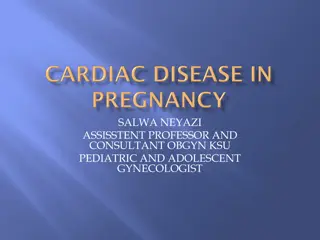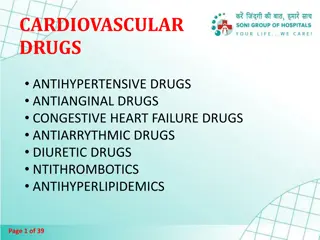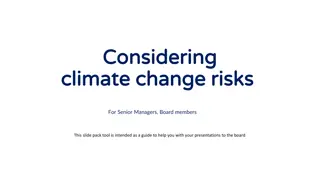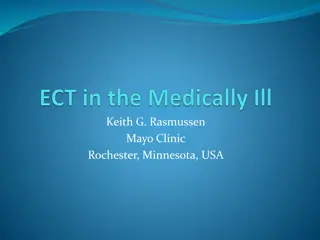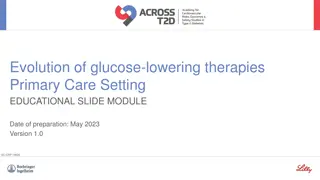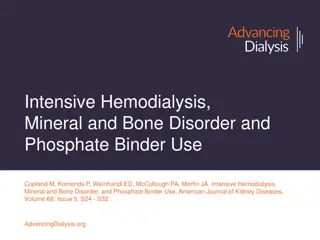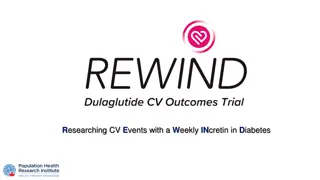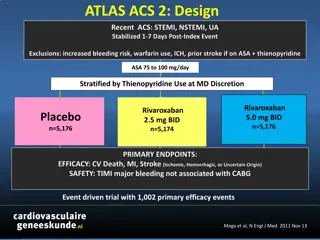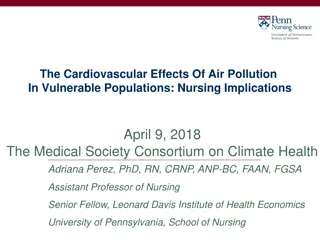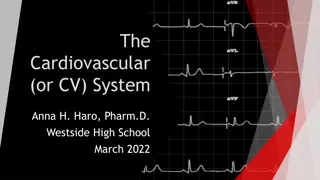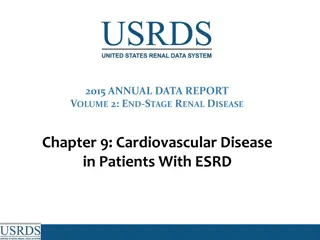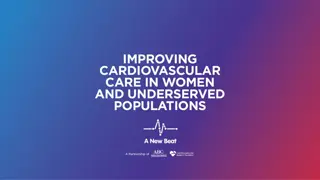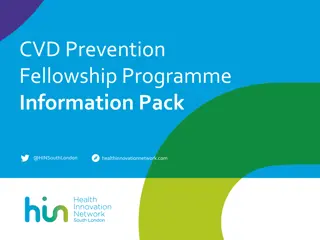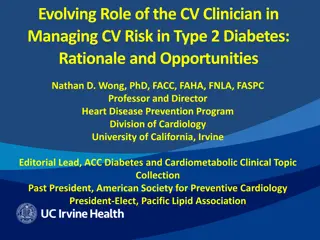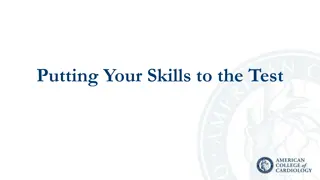Understanding the Cardiovascular System
Explore the closed system of the cardiovascular system where blood is contained within the heart and vessels. Learn about the total blood volume and its significance for overall health and function.
4 views • 21 slides
AHA Clinical Update Slide Set
The evidence-based science and clinical management of Cardiovascular-Kidney-Metabolic Syndrome (CKM) in this comprehensive slide set. Learn about the pathophysiological interactions, multi-organ dysfunction, and adverse cardiovascular outcomes associated with CKM.
0 views • 14 slides
Cardiovascular Disease in HIV
The increased risk of cardiovascular disease in people with HIV and specific strategies to treat it. This presentation discusses potential mechanisms, comorbidity gaps, and the impact of traditional risk factors. Explore the role of inflammation and immune dysfunction in atherosclerosis and vulnerab
0 views • 38 slides
Inflammation and Cholesterol Predicting Cardiovascular Events
This study explores how inflammation and cholesterol levels predict cardiovascular events among 13,970 statin-intolerant patients in the CLEAR Outcomes trial. Findings suggest residual inflammatory risk may be a stronger predictor than residual cholesterol risk for future events. The research analyz
0 views • 17 slides
Managing Power Platform Risk with an Environment Strategy by Frank Shink, Senior Power Platform Design Engineer at Ameriprise Financial
Frank Shink, a seasoned professional, delves into the risks associated with Power Platform, from development risks to cost risks, and offers insights on tools and strategies to combat these risks effectively. He emphasizes the importance of environments, DLP policies, and licensing strategies in mit
1 views • 20 slides
Ticagrelor Monotherapy vs. 12-Month Dual Anti-Platelet Therapy After Coronary Stent Implantation for ACS
The study compares the efficacy of ticagrelor monotherapy after less than 1 month of dual anti-platelet therapy (DAPT) to 12-month ticagrelor-based DAPT in patients with acute coronary syndrome (ACS) undergoing percutaneous coronary intervention (PCI) with drug-eluting stent implantation. The aim is
1 views • 19 slides
Insights from the REPRIEVE Trial for Managing Cardiovascular Risk in Patients with HIV
Cardiovascular disease is a growing concern in individuals living with HIV, despite advancements in treatment. The REPRIEVE Trial sheds light on the importance of assessing cardiovascular risk and implementing primary prevention measures in this population. Dr. Grinspoon's financial disclosures and
0 views • 35 slides
Comprehensive Update on Type 2 Diabetes Management and Cardiovascular Health
This update covers key aspects of managing type 2 diabetes and addressing cardiovascular risks, including discussions on GLP-1 receptor agonists, patient safety concerns, evidence-based recommendations, and individualized therapy approaches. It also includes a patient case study highlighting the imp
3 views • 52 slides
Advanced Cardiovascular Life Support Algorithm
This advanced cardiovascular life support algorithm provides step-by-step guidance in managing cardiac emergencies such as cardiac arrest, arrhythmias, and other life-threatening conditions. The algorithm includes a series of slides detailing important procedures and interventions to improve patient
5 views • 9 slides
The REPRIEVE Trial: Developing Cardiovascular Disease Prevention Strategy for People Living with HIV
The REPRIEVE trial focuses on developing a cardiovascular disease prevention strategy for individuals living with HIV. It addresses the increased risk of CVD in this population, even with good viral suppression. The study evaluates the use of pitavastatin, a statin with anti-inflammatory properties,
1 views • 33 slides
Pediatric Cardiovascular Exam Overview
Explore the differences between pediatric and adult cardiovascular exams, highlighting key differences in disease patterns, examination approaches, and objectives. Learn about the importance of distinguishing between routine well-baby exams and evaluations of ill children, along with step-by-step gu
6 views • 24 slides
Understanding Cardiac Rehabilitation and Physiotherapy Approaches
Explore the comprehensive agenda covering topics like the general structure of the circulatory system, blood circulation in the human body, risk factors for cardiovascular diseases, and physiotherapeutic approaches in cardiac rehabilitation. Gain insights into the anatomy of the heart, arteries, vei
6 views • 14 slides
CLEAR Outcomes Trial: Bempedoic Acid for Cardiovascular Prevention
The CLEAR Outcomes Trial investigated the effects of bempedoic acid, an ATP citrate lyase inhibitor, on cardiovascular outcomes in primary prevention patients. Results showed a reduction in cardiovascular events with bempedoic acid, particularly in patients intolerant to statins. Baseline characteri
1 views • 13 slides
Effects of Exercise on the Cardiovascular System
Exploring the immediate and long-term effects of exercise on the cardiovascular system reveals the remarkable adaptations and responses the body undergoes. From short-term increases in heart rate and blood pressure to long-lasting changes in cardiac output, exercise plays a crucial role in enhancing
0 views • 13 slides
Impact of Diet on Cardiovascular Health
The impact of diet on the cardiovascular system is significant, with a high intake of LDL leading to clogged arteries and increased risk of Coronary Heart Disease. Regular exercise brings about positive changes in the cardiovascular system, enhancing heart function and oxygen delivery. Immediate ben
0 views • 7 slides
Residual Inflammatory and Cholesterol Risks in Atherosclerosis Patients
In a secondary analysis of the CANTOS study, researchers evaluated the impact of residual inflammatory risk and residual cholesterol risk in a large cohort of atherosclerosis patients already receiving lipid-lowering therapy. Results showed the relative contributions of inflammation and cholesterol
1 views • 11 slides
Comprehensive Health Assessment and Wellness Analysis Guide
This guide provides detailed insights into assessing autonomic balance, stress levels, and cardiovascular health through various parameters like SDNN, HRV, ANS activity, and artery state. Understanding these factors can help in determining overall health status and potential risks associated with au
0 views • 4 slides
Identifying and Mitigating GBV Risks in COVID-19 Response for Food Security in Rakhine State, Myanmar
Rakhine State faces challenges of conflict, displacement, and restricted movement, with many relying on food assistance. Cash assistance implementation did not escalate GBV risks. The COVID-19 restrictions heightened the need for adjustments in programming, requiring monitoring of assistance changes
0 views • 5 slides
Understanding Artificial Intelligence Risks in Short and Long Term
This content delves into the risks associated with artificial intelligence, categorizing them into short-term accident risks and long-term accident risks. Short-term risks include issues like robustness problems and interruptibility, while long-term risks focus on competence and alignment challenges
0 views • 15 slides
Morphologic and Physiologic Connections in Blood Pressure Waveforms for Cardiovascular Event Prediction
This report discusses the morphologic and physiologic connections in continuous blood pressure waveforms and their association with incident cardiovascular events. The study aims to assess if changes in arterial elasticity contribute to predicting CVD events and explores additional measures derived
0 views • 30 slides
The Importance of Addressing Cardiovascular Disease in Maternal Health
Cardiovascular disease remains a significant contributor to maternal mortality in the UK, with maternal deaths from cardiac issues outnumbering those from other direct causes, except thrombosis. The prevalence of cardiovascular risk factors in pregnant women, combined with a lack of consideration fo
0 views • 22 slides
Prevalence of Cardiovascular Disease in Adult ESRD Patients: 2016 Data Report
The data report examines the prevalence of cardiovascular diseases in adult End-Stage Renal Disease (ESRD) patients in 2016 by treatment modality and age. It includes information on various cardiovascular conditions such as atrial fibrillation, acute myocardial infarction, coronary artery disease, a
2 views • 25 slides
Understanding Cardiovascular Changes in Pregnancy
This informative content discusses the normal physiological changes of the cardiovascular system in pregnancy, symptoms and signs of cardiovascular disease, the impact of pregnancy on cardiovascular health, and the management of cardiovascular issues during pregnancy, labor, and the postpartum perio
0 views • 28 slides
Understanding Cardiovascular Drugs: An Overview of Treatment Options
Explore the world of cardiovascular drugs, including antihypertensive, antianginal, heart failure, antiarrhythmic, diuretic, antithrombotic, and antihyperlipidemic medications. Dive into the mechanisms of action, clinical indications, and adverse effects of these drugs, gaining valuable insights int
0 views • 39 slides
Addressing Climate Change Risks: Guidance for Senior Managers and Board Members
This slide pack tool provides guidance on addressing climate change risks for senior managers and board members. It covers key messages such as understanding obligations and gaps, identifying climate change risks, exploring responsibilities, and implementing actions to address these risks effectivel
0 views • 11 slides
Comprehensive Overview of Medical Risks and Strategies in ECT
In this detailed presentation, various aspects of medical risks associated with Electroconvulsive Therapy (ECT) are discussed, along with strategies to mitigate complications. Topics covered include the physiological effects of ECT on the cardiovascular, neurological, and endocrine systems, as well
0 views • 27 slides
Understanding Women's Health: Risks, Prevention, and Care
Women's health encompasses the screening, diagnosis, and management of diseases and conditions affecting physical and emotional well-being. Services are provided by a diverse team of healthcare professionals specializing in obstetrics, gynecology, surgery, and primary care. Cardiovascular disease is
0 views • 46 slides
Understanding the Risks of Cheap Natural Gas and Hydraulic Fracking
This introduction delves into the multifaceted risks associated with the exploitation of cheap natural gas and hydraulic fracking. Covering climate risks, economic consequences of petro-states, direct GHG risks, and local environmental risks, the content underscores the complex challenges and implic
0 views • 8 slides
Evolution of Glucose-Lowering Therapies in Primary Care Settings
Cardiovascular effects of older glucose-lowering therapies and the history of cardiovascular outcome trials are discussed in this educational slide module. It outlines the timeline of treatment options from the discovery of insulin to the introduction of various medications. Evidence regarding the c
0 views • 29 slides
Management of Mineral and Bone Disorder in Intensive Hemodialysis Patients
Serum phosphorus levels play a crucial role in cardiovascular risk among hemodialysis patients. Despite relatively unchanged levels over the years, a significant percentage of patients still have elevated phosphorus levels, posing cardiovascular risks. Proper adherence to phosphate binders is essent
0 views • 7 slides
Investigating the Impact of Weekly Incretin on Cardiovascular Events in Diabetes
Individuals with type 2 diabetes have an increased risk of cardiovascular events compared to those without the condition. Research indicates that certain GLP-1 receptor agonists have shown promising results in reducing cardiovascular events in diabetic patients with specific HbA1c levels. However, t
0 views • 69 slides
Clinical Trial Results of Rivaroxaban in ACS Patients: ATLAS-ACS 2 Study
The ATLAS-ACS 2 study investigated the efficacy and safety of rivaroxaban in ACS patients post-index event. The primary endpoints included cardiovascular death, MI, and stroke, with significant reductions seen with rivaroxaban compared to placebo. Stent thrombosis was also reduced with rivaroxaban t
0 views • 10 slides
GripTrack: Innovative Device for Monitoring Elderly Health
GripTrack is a portable grip strength monitoring device designed to track cardiovascular and musculoskeletal health in the elderly population. It aims to provide an accurate early warning system by assessing grip strength, which can indicate cognitive decline, cardiovascular health, and frailty synd
0 views • 14 slides
Understanding the Cardiovascular Effects of Air Pollution in Vulnerable Populations
This presentation discusses the significant cardiovascular effects of air pollution, particularly on vulnerable populations such as older adults, women, and Latinos. It highlights the environmental factors contributing to cardiovascular health disparities and emphasizes the nursing implications for
0 views • 13 slides
Understanding the Cardiovascular System: Anatomy, Physiology, and Function
Explore the intricate workings of the cardiovascular system, encompassing the heart, blood vessels, and blood circulation. Learn the anatomy, physiology, and function of this vital system, including the roles of arteries, veins, capillaries, and red and blue blood. Understand how the cardiovascular
0 views • 23 slides
Cardiovascular Disease in End-Stage Renal Disease Patients: Data Analysis 2011-2013
Understanding the prevalence and causes of cardiovascular diseases in patients with End-Stage Renal Disease (ESRD) is crucial for effective management. This report analyzes data from 2011-2013, focusing on the causes of death in ESRD patients, prevalence of cardiovascular diseases by treatment modal
0 views • 18 slides
Insights on Cardiometabolic Risk Reduction and Diabetes Treatment in 2019
Cardiologists in 2019 must address the significant cardiovascular risks associated with diabetes mellitus. Dr. Keith C. Ferdinand highlights the increased rates of heart disease, stroke, and heart failure in patients with diabetes. Despite advancements, cardiovascular risk management remains subopti
0 views • 10 slides
Cardiovascular Disease Prevention Fellowship Programme Information Pack
The Cardiovascular Disease Prevention Fellowship Programme by Health Innovation Network offers a comprehensive 7-month program for healthcare professionals to enhance their skills in cardiovascular disease prevention. The program includes clinical webinars, improvement collaborative sessions, and qu
0 views • 14 slides
The Evolving Role of Cardiovascular Clinicians in Managing Type 2 Diabetes Risk
The role of cardiovascular clinicians in managing cardiovascular risk in patients with type 2 diabetes is evolving, with a growing emphasis on collaboration with multidisciplinary teams. Recognizing the potential benefits of certain diabetes medications on cardiovascular outcomes, clinicians are urg
0 views • 25 slides
Understanding PCSK9 Inhibitors for Cardiovascular Health
PCSK9 inhibitors are a novel class of medications that help lower LDL cholesterol levels, reducing the risk of cardiovascular events. This article covers their mechanism of action, patient groups benefiting from them, efficacy in LDL-C lowering, and safety considerations. Learn how PCSK9 inhibitors
0 views • 8 slides
